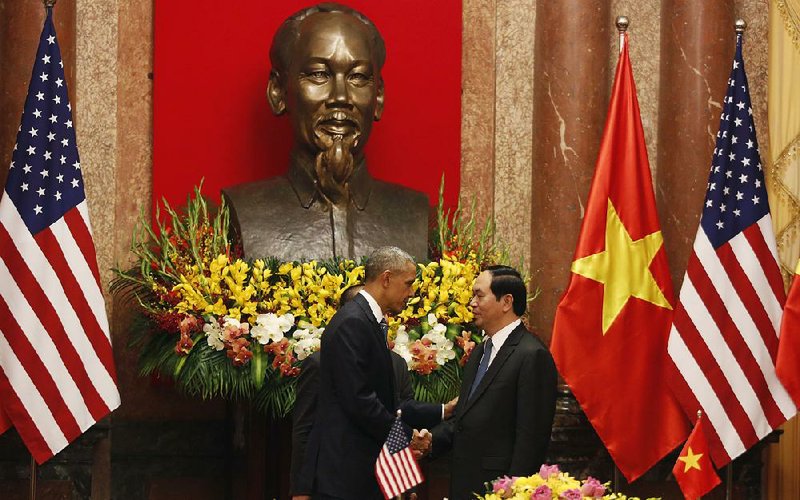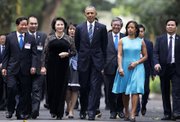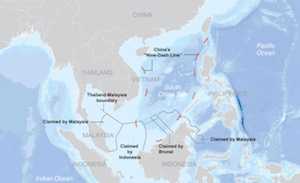HANOI, Vietnam -- The United States is rescinding a decades-old ban on sales of lethal military equipment to Vietnam, President Barack Obama announced at a news conference in Hanoi on Monday, ending one of the last legal vestiges of the Vietnam War.
The United States has long made lifting the embargo contingent on Vietnam's improving its human-rights record, and recently administration officials had hinted that the ban could be removed partly in response to China's buildup in the South China Sea.
But Obama portrayed the decision as part of the long process of normalizing relations between the two countries after the Vietnam War.
Tracing the arc of the U.S.-Vietnamese relationship through cooperation, conflict, "painful separation" and a long reconciliation, Obama marveled during a news conference with the Vietnamese president that "if you consider where we have been and where we are now, the transformation in the relations between our two countries is remarkable."
"The decision to lift the ban was not based on China or any other considerations," he said, with the Vietnamese president, Tran Dai Quang, standing by his side. "It was based on our desire to complete what has been a lengthy process of moving toward normalization with Vietnam."
Obama acknowledged, however, that the United States and Vietnam share a mutual concern over China's provocations in the region, and he reiterated a previous pledge that the United States would "continue to fly, sail and operate wherever international law allows."
Quang said later at a state luncheon that he was grateful for the American people's efforts to put an end to "an unhappy chapter in the two countries' history," referring to the 1965-1975 U.S. war with Vietnam's communists, who now run the country.
The conflict killed 57,000 American military personnel and as many as 2 million Vietnamese.
Obama insisted that the move should not be interpreted as carte blanche for weapons sales to Vietnam and that the United States would review future arms sales to "examine what's appropriate and what's not," as it does with any country.
"We're going to continue to engage in the case-by-case evaluation of these sales," Obama said. "But what we do not have is a ban that is based on an ideological division between our two sides."
As for human rights, he said, "this is an area where we still have differences."
Obama is to address the Vietnamese people this morning. A White House official said the president would use his address to stress the importance of having a "constructive dialogue" even when the two nations disagree -- including on human rights.
Human-rights advocates, who had asked Obama to hold off on lifting the ban until Vietnam had released some prominent political prisoners and promised to stop police beatings of protesters, condemned the decision.
"President Obama just gave Vietnam a reward that they don't deserve," said John Sifton, the Asia policy director of Human Rights Watch.
Duy Hoang, U.S.-based spokesman for Viet Tan, a pro-democracy party that is banned inside Vietnam, said that until Vietnam makes progress on human rights, the U.S. should not sell it military gear that could be used against the population.
"The U.S. should also reiterate the message that closer security cooperation is to bolster Vietnam's external security and that the proper role of the Vietnamese military is to protect the nation, not the current political regime," Hoang said by email.
Quang defended his country's rights record.
"The consistent position and viewpoint of the Vietnamese government is to protect and promote human rights," he said, adding: "Those achievements have been highly recognized and appreciated by the international community."
Obama said there had been "modest progress on some of the areas that we've identified as a concern." He added that the 12-nation trans-Pacific trade deal that he's pushing could help prompt Vietnam to implement a series of labor reforms "that could end up being extraordinarily significant."
South China Sea
U.S. officials have portrayed lifting the embargo as part of a strategy to help Vietnam defend itself against an increasing threat from China in the South China Sea.
Obama said improved ties make sense for the United States, since Vietnam is a fast-growing country in one of the fastest-growing regions of the world.
He predicted that the Trans-Pacific Partnership, a trade deal among 12 nations that is stalled in Congress but that would benefit Vietnam greatly, would someday become law.
"I remain confident we're going to get it done, and the reason I remain confident is because it's the right thing to do," he said, acknowledging that "the politics will be noisy."
All three remaining presidential candidates in the United States -- Republican Donald Trump and Democrats Hillary Clinton and Sen. Bernie Sanders -- oppose the pact.
Obama's trip to Vietnam is part of an effort by the Southeast Asian nation to recalibrate its relationship with China, its neighbor in the north. China remains Vietnam's largest trading partner and an ideological ally, but the two countries have sparred over Beijing's claims of waters off Vietnam's coast in the South China Sea. The United States has sought to assert freedom of navigation in those areas, as well as others contested by Japan and the Philippines -- both U.S. allies.
Since 2014, when China placed an oil rig in waters near the Paracel Islands, which Vietnam claims, Hanoi has repeatedly asked Washington for the freedom to buy U.S. lethal weapons. The United States partly relaxed the ban two years ago, allowing the purchase of nonlethal equipment for maritime defense.
The Chinese military has also embarked on a land reclamation project in the disputed Spratly Islands, prompting the U.S. Navy to conduct two freedom of navigation missions aimed at dissuading Beijing from militarizing the area.
The Philippines has taken its claims against China over sovereignty in coastal regions to an international tribunal at the Hague, a case being closely monitored in Washington. The ruling is expected in June, but China has said it does not recognize the tribunal's authority in the matter.
"Our hope is that ultimately the various claims and disputes can be resolved," Obama said. "We are doing everything we can to promote that."
China's reaction to the decision Monday was subdued.
"The arms embargo is a product of the Cold War and should never have existed," Hua Chunying, a spokesman for the Foreign Ministry, said during a regular news briefing in Beijing. "We welcome normal relations between Vietnam and the United States."
However, China's state news service Xinhua reacted negatively, accusing the United States of having "shown no restraint in meddling in a regional situation" in the South China Sea.
Fulbright University
Obama also announced on Monday that the two sides had formalized an agreement to allow the opening of Fulbright University Vietnam in Ho Chi Minh City, the first independent university in Vietnam in which the government will have no role in creating the curriculum or teaching students.
The university's chairman, Bob Kerrey, a former senator from Nebraska, said the school might start teaching undergraduates in the fall of 2017.
Obama also announced new commercial deals worth more than $16 billion, including one in which Boeing will sell 100 aircraft and Pratt & Whitney will sell 135 advanced aircraft engines to VietJet, a privately owned low-cost airline.
He also said that for the first time, Peace Corps volunteers would be posted to Vietnam and focus on teaching English.
Earlier in the morning, Obama was whisked through the streets of Hanoi for a highly choreographed arrival ceremony at the Presidential Palace, a monument of French colonial architecture painted a dusky mustard. His route was lined with children wearing red-white-and-blue outfits and waving small American and Vietnamese flags.
After spending his first day in Vietnam shuttling among meetings with different government leaders, Obama will spend the next two days speaking directly to the Vietnamese people and meeting with civil society groups and young entrepreneurs.
Information for this article was contributed by Gardiner Harris, Jane Perlez and Nicola Clark of The New York Times; by Nancy Benac, Foster Klug, Tammy Webber, Dan Elliott and Matthew Pennington of The Associated Press; and by David Nakamura of The Washington Post.
A Section on 05/24/2016


